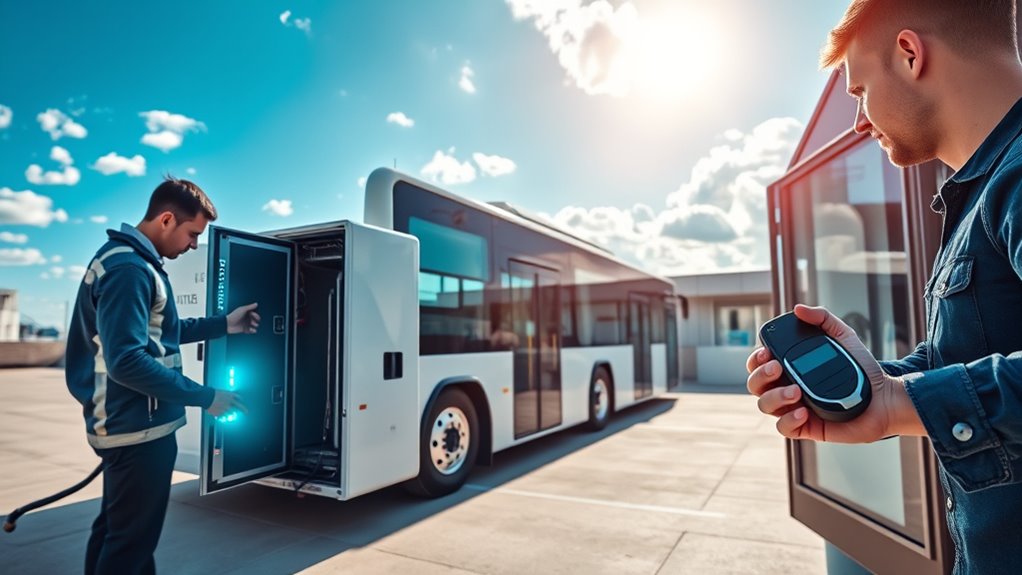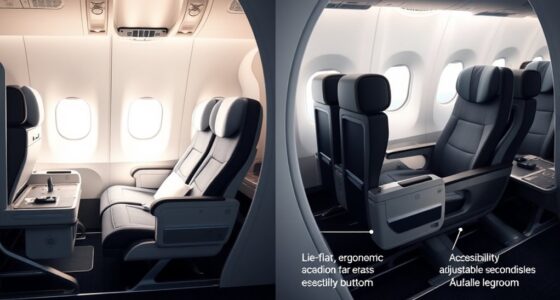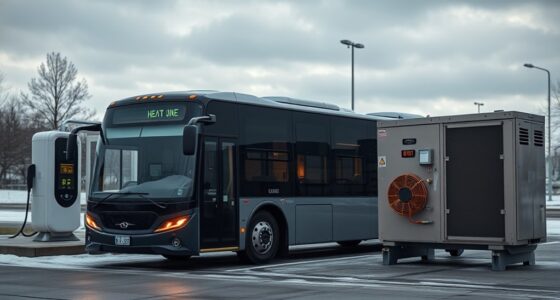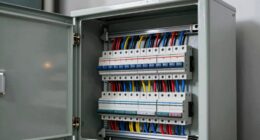When choosing between leasing or purchasing batteries for electric buses, consider your financial situation, usage plans, and long-term goals. Leasing offers lower upfront costs, includes maintenance, and provides flexibility to upgrade, but may limit residual value benefits. Purchasing involves a larger initial investment but gives you complete control, potential savings over time, and better long-term value if you properly maintain the batteries. Understanding these options helps you make smarter decisions—more insights await to guide your choice.
Key Takeaways
- Leasing reduces upfront costs and offers flexibility to upgrade batteries more frequently.
- Purchasing provides full ownership, potential long-term savings, and control over maintenance routines.
- Lease residual value depends on battery health and degradation, influencing end-of-lease costs.
- Buying involves higher initial investment but may maximize battery lifespan and resale value with proper care.
- Decision depends on usage patterns, financial capacity, and preference for predictable expenses versus long-term control.

Are you trying to decide between leasing or purchasing a battery for your electric vehicle? This choice hinges on several factors, but two of the most critical are battery longevity and residual value. When considering leasing, you benefit from lower upfront costs and the flexibility to upgrade batteries more frequently. Leasing companies often include maintenance and warranty services, which can help extend battery longevity by ensuring proper care and timely replacements. Since you’re not responsible for the battery’s long-term degradation, leasing can be appealing if you want predictable expenses and peace of mind. However, keep in mind that the residual value of a leased battery is fundamentally negotiated at the end of the lease term. If the battery’s capacity diminishes faster than expected, it might impact the residual value, potentially leading to higher costs when returning or upgrading.
On the other hand, purchasing a battery means you own it outright, which can be advantageous if you’re planning to keep the vehicle for the long haul. When you own the battery, you have more control over its maintenance and can maximize its lifespan by following recommended care routines. Battery longevity becomes a key consideration here. A well-maintained battery can last many years, which directly influences the residual value of your electric bus. A higher residual value means you might recoup more when selling or trading in the vehicle later. Additionally, research into sound healing science suggests that understanding the mechanisms behind cellular regeneration and health can inform better maintenance practices for batteries and other vital components. However, purchasing also comes with the risk that the battery’s capacity will decline over time, decreasing its residual value and affecting your overall investment. If the battery degrades faster than anticipated, you might face costly replacements or reduced performance, which can impact your long-term costs and residual value.
Ultimately, your decision should balance your financial situation with how you plan to use and maintain the vehicle. Leasing offers the advantage of lower initial costs and less concern about battery aging, but it might limit your ability to extract value from the residual when the lease ends. Purchasing requires a larger upfront investment, but it can provide greater long-term benefits if you’re committed to maximizing the battery’s longevity and residual value. Carefully evaluate your usage patterns, maintenance plans, and how long you expect to keep the vehicle. In either case, understanding how battery longevity influences residual value will help you make a smarter, more informed choice for your electric bus.
Frequently Asked Questions
How Does Residual Value Impact Leasing Versus Purchasing Costs?
Residual value profoundly impacts leasing and purchasing costs by influencing residual depreciation and asset valuation. When you lease, a higher residual value reduces your payments because the vehicle’s value at lease end is expected to be higher. For purchasing, a better residual value boosts the asset’s worth, potentially increasing resale profits. Understanding these factors helps you evaluate which financing model minimizes costs based on the anticipated value after use.
Are There Tax Benefits Specific to Leasing Electric Bus Batteries?
You can benefit from tax incentives when leasing electric bus batteries, which often include specific leasing benefits. These incentives might diminish your taxable income or provide direct credits, making leasing more financially attractive. Leasing benefits can also include simplified maintenance and lower upfront costs. Be sure to check local regulations and consult a tax professional to maximize these benefits and ensure compliance.
What Are the Long-Term Maintenance Implications of Each Model?
If you lease batteries, you’ll likely face lower long-term maintenance costs because the leasing company handles battery maintenance, ensuring ideal lifespan and reducing your concern over battery lifespan. In contrast, purchasing batteries means you’re responsible for maintenance scheduling, which can be costly and complex as batteries age. Regular upkeep becomes critical to maximize battery lifespan, so consider how proactive maintenance influences your overall operational expenses.
How Do Lease Agreements Address Battery Replacement or Upgrades?
Like a safety net beneath a tightrope, lease agreements often include clear provisions for battery replacement or upgrades. You’ll find battery warranty and upgrade clauses that specify responsibility if batteries degrade or need upgrading. These clauses protect you from unexpected costs, ensuring that the leasing company handles battery maintenance or replacement, allowing you to focus on operation without worry. This arrangement makes it easier to keep your fleet running smoothly.
What Are the Risks Associated With Battery Technology Obsolescence?
You face risks with battery technology obsolescence due to rapid technological innovation, which can make your batteries outdated quickly. Battery degradation over time reduces performance, potentially limiting your bus’s range and efficiency. Staying updated with industry advancements helps. If you lease batteries, upgrades may be easier, but purchasing might require costly replacements. Being aware of these risks allows you to plan financially and operationally for future battery developments.
Conclusion
Ultimately, choosing between leasing and purchasing your electric bus battery isn’t just a decision; it’s a game-changer. Leasing can keep your costs flexible and predictable, while buying might seem like the ultimate power move. But remember, the right choice can make your fleet as unstoppable as a freight train barreling through mountains. Weigh your options carefully—your decision could shape the future of your transit system more dramatically than you ever imagined.









